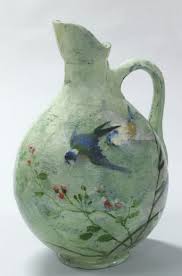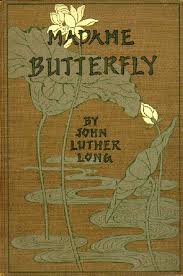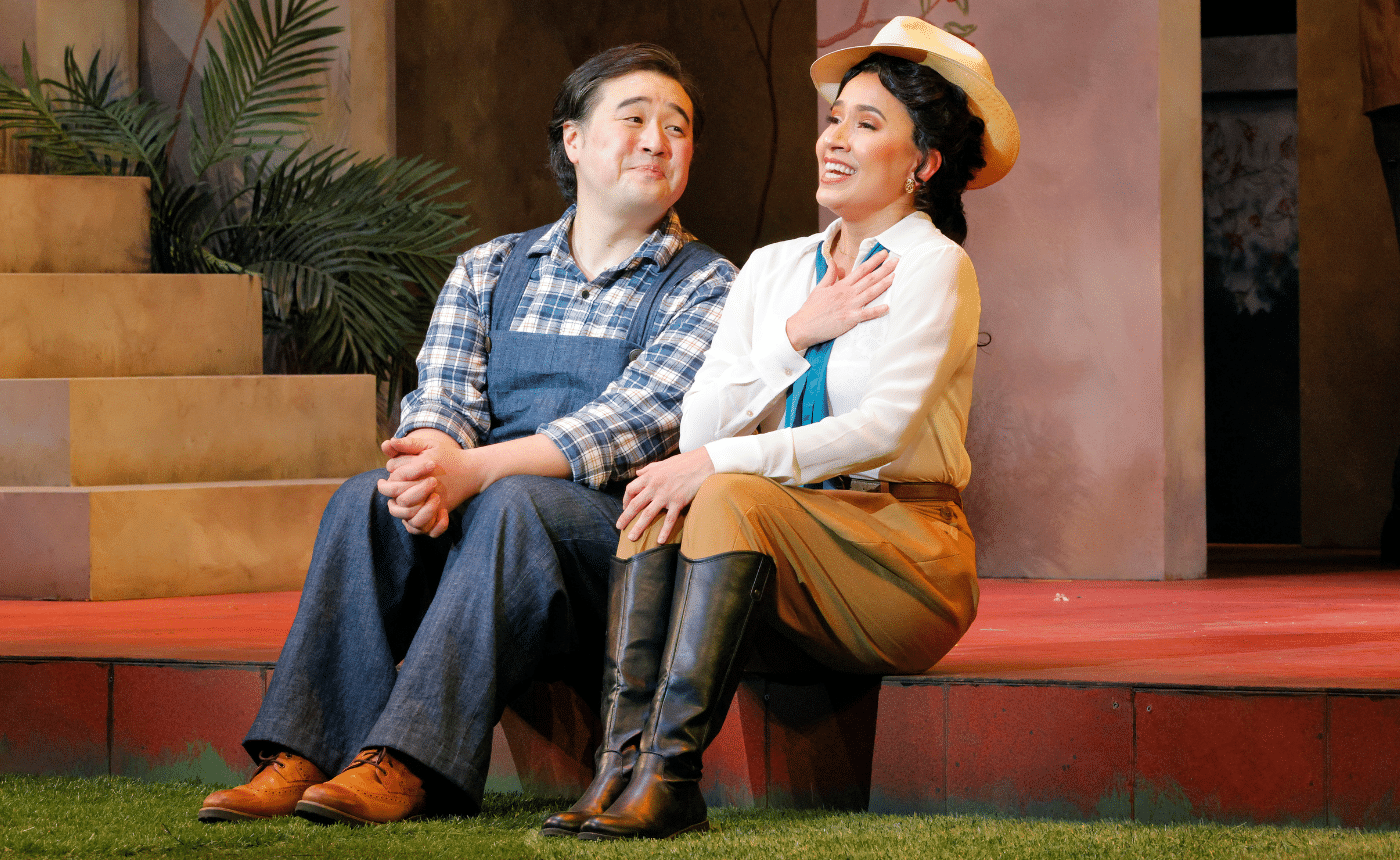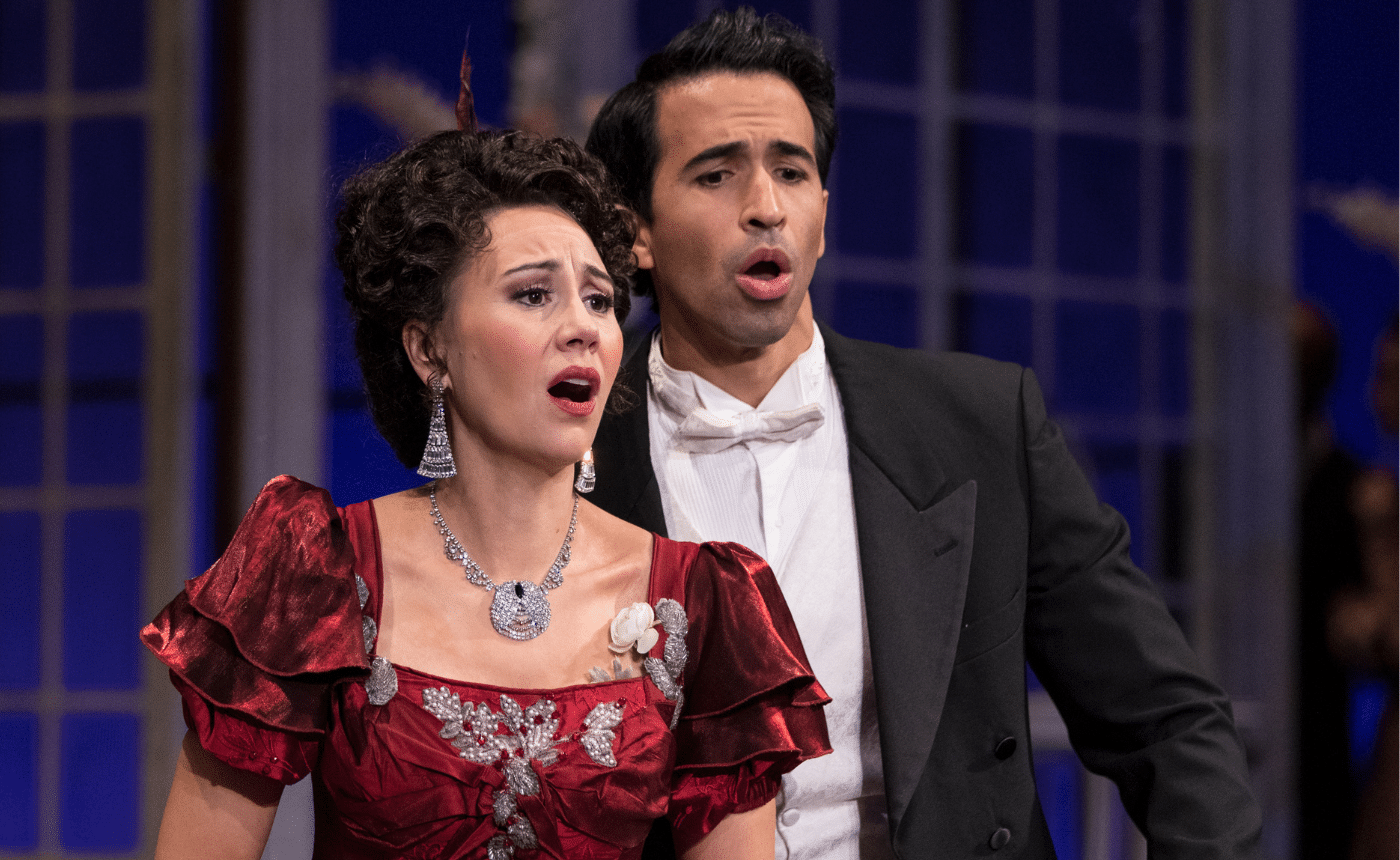The Making of Madame Butterfly – Part One. The Story.
 Part One. The Story.
Part One. The Story.
In 1881 John Luther Long was admitted to the Pennsylvania Bar; when he wasn’t lawyering in Philadelphia he wrote stories and plays. His first published story was Miss Cherry Blossom of Tokyo and many of his subsequent tales, including, of course, Madame Butterfly, were also situated in Japan. To the nineteenth-century Westerner, Japan – indeed all things Japanese – was a source of endless fascination. The country, which had been virtually sealed off from the rest of the world for centuries, was slowly opening up: treaties were signed; international trade and diplomatic relations were established; missionaries flocked to convert these exotic creatures to some form of Christianity. From the middle of the nineteenth century on, every major international exhibition in Europe and America had a huge Japanese presence: paintings; silks; pottery; books; music. Museums and art-dealers bought what they could. The culture of this still fairly mysterious nation grabbed European and American imaginations to such an extent that a new noun was coined by the French: Japonisme.
John Luther Long came by his Japonisme honestly. His older sister, Jennie, was married to Dr. Irvin H. Correll of the American Methodist Mission, who was appointed headmaster of a boys’ school in Nagasaki. The couple arrived there in 1892 with a two-year contract, but they stayed on a further three years, returning to America in 1897. Jennie told her brother of an incident she had heard of that had happened in Nagasaki. According to her (much, much later – 1931, to be exact!) account, John wrote the story virtually over-night. When he read it to her he was most concerned that the local details were correct. Undoubtedly they were, for he had been greatly influenced by a French novel published in 1887, which had been wildly successful and had been translated into several languages, including English.
 That novel, Madame Chrysanthème, is a thinly-disguised account of the time that Julien Marie Viaud, a French naval officer, spent in Nagasaki from July to mid-August 1885, while his ship was being overhauled, during which time he married a seventeen-year-old native girl named O-Kane-San. Such marriages were quite usual; Viaud notes in a letter that they were valid for as long as both parties agreed. He also explains that these “temporary brides” were not usually geishas, who were professional entertainers with some kind of artistic talent; nor were they considered common prostitutes: they hovered somewhere between the two. Viaud’s nom-de-plume was Pierre Loti, the author of some forty novels, many of them based on his own experiences in the navy.
That novel, Madame Chrysanthème, is a thinly-disguised account of the time that Julien Marie Viaud, a French naval officer, spent in Nagasaki from July to mid-August 1885, while his ship was being overhauled, during which time he married a seventeen-year-old native girl named O-Kane-San. Such marriages were quite usual; Viaud notes in a letter that they were valid for as long as both parties agreed. He also explains that these “temporary brides” were not usually geishas, who were professional entertainers with some kind of artistic talent; nor were they considered common prostitutes: they hovered somewhere between the two. Viaud’s nom-de-plume was Pierre Loti, the author of some forty novels, many of them based on his own experiences in the navy.
 Since Long had no first-hand experience of Japan, much of his detail is taken from Loti: a Foreign Sailor (henceforth: F.S.) arrives in Nagasaki for an unspecified, but limited, period of time; F.S. is contemptuous of the Japanese with whom he comes in contact; F.S. acquires, through a marriage-broker, a bride (costing 100 yen per month) and a house on a hill overlooking the city; both the marriage contract and the lease of the house can easily be cancelled; the house, with its paper walls and sliding panels, is a source of wonder; the bride’s relatives; the inevitable lanterns. There are considerable differences, too, of course. The F.S’s (at least Loti’s) dream of Japan – “an unlooked-for Eden” – is destroyed almost immediately: Nagasaki quickly looks like “any other commonplace town…an artificial creation.” The sub-text of Loti’s novel, a lament for a Japan that seems to have abandoned its ancient traditions in its desire to “Westernize” itself, is expressed early on: “Some day, when man shall have made all things alike, the earth will be a dull, tedious dwelling-place, and we shall have even to give up travelling and seeking for a change which shall no longer be found.” (Fast forward to today, when, for instance, American fast-food restaurants are ubiquitous in every European, and probably every Asian, city too!) And having contracted a local marriage he is at once repelled by the idea: “…it seems to me that my betrothal is a joke, and my new family a set of puppets.” Benjamin Franklin Pinkerton, the (American) sailor of Long’s story, has no qualms about his marriage, but is equally contemptuous of his newly-acquired Japanese in-laws: “…an appalling horde of these at the wedding…with lanterns and banners…”
Since Long had no first-hand experience of Japan, much of his detail is taken from Loti: a Foreign Sailor (henceforth: F.S.) arrives in Nagasaki for an unspecified, but limited, period of time; F.S. is contemptuous of the Japanese with whom he comes in contact; F.S. acquires, through a marriage-broker, a bride (costing 100 yen per month) and a house on a hill overlooking the city; both the marriage contract and the lease of the house can easily be cancelled; the house, with its paper walls and sliding panels, is a source of wonder; the bride’s relatives; the inevitable lanterns. There are considerable differences, too, of course. The F.S’s (at least Loti’s) dream of Japan – “an unlooked-for Eden” – is destroyed almost immediately: Nagasaki quickly looks like “any other commonplace town…an artificial creation.” The sub-text of Loti’s novel, a lament for a Japan that seems to have abandoned its ancient traditions in its desire to “Westernize” itself, is expressed early on: “Some day, when man shall have made all things alike, the earth will be a dull, tedious dwelling-place, and we shall have even to give up travelling and seeking for a change which shall no longer be found.” (Fast forward to today, when, for instance, American fast-food restaurants are ubiquitous in every European, and probably every Asian, city too!) And having contracted a local marriage he is at once repelled by the idea: “…it seems to me that my betrothal is a joke, and my new family a set of puppets.” Benjamin Franklin Pinkerton, the (American) sailor of Long’s story, has no qualms about his marriage, but is equally contemptuous of his newly-acquired Japanese in-laws: “…an appalling horde of these at the wedding…with lanterns and banners…”
Both Loti’s novel and Long’s story begin at the same juncture: a foreign ship approaches the port of Nagasaki. Loti, in his “Introduction”, tells his fellow-sailor, Yves, that he will ” ‘at once marry…I shall choose a little yellow-skinned woman with black hair and cat’s eyes. She must be pretty. Not bigger than a doll.’ …led on by ennui and solitude, I had gradually arrived at dreaming of and looking forward to this absurd marriage.” Long begins with an on-board conversation between Pinkerton and his fellow-sailor Sayre, who suggests he should get married “for lack of other amusement…There is no danger of you losing your head…The danger would probably be entirely with – the other person…You are hard to comfort – humanly speaking…Impervious.” Long comments that this is a “quite exact characterization” of Pinkerton, who seems to want to get married as soon as possible.
 “But Pinkerton not only got himself married; he provided himself with an establishment,” begins Long’s second chapter. Which parallels Loti’s renting the second floor of a house on a hill overlooking the harbor, but outside the so-called “Foreign Concession” where non-Japanese were supposed to live. “With the aid of a marriage-broker, he found both a wife (Madame Butterfly, or Cho-Cho-San) and a house in which to keep her.” Both the marriage and the lease can be dissolved “by the mere neglect to pay the rent”. (Loti says whenever either party wants it). Long gives us “an appalling horde” of relatives; Loti’s are fewer and not so despicable, but Long’s “lanterns and banners” are taken directly from the novel. Pinkerton provides locks for the doors (unheard of in Japan then) to keep out Butterfly’s relations: “You will have to get along without ancestors…We can’t adopt a whole regiment of back numbers, you know.” His friend Sayre can’t make him understand (because, Long notes, “he did not try to understand”) the importance of ancestors to the Japanese. To Pinkerton, his bride “was quite an impossible little thing, outside of lacquer and paint.” The relatives come a-calling to try to convince the American to allow them to visit, but he merely insults them: “…you look exactly like a lacquered tragedy mask I have hanging over my desk…” They disown her.
“But Pinkerton not only got himself married; he provided himself with an establishment,” begins Long’s second chapter. Which parallels Loti’s renting the second floor of a house on a hill overlooking the harbor, but outside the so-called “Foreign Concession” where non-Japanese were supposed to live. “With the aid of a marriage-broker, he found both a wife (Madame Butterfly, or Cho-Cho-San) and a house in which to keep her.” Both the marriage and the lease can be dissolved “by the mere neglect to pay the rent”. (Loti says whenever either party wants it). Long gives us “an appalling horde” of relatives; Loti’s are fewer and not so despicable, but Long’s “lanterns and banners” are taken directly from the novel. Pinkerton provides locks for the doors (unheard of in Japan then) to keep out Butterfly’s relations: “You will have to get along without ancestors…We can’t adopt a whole regiment of back numbers, you know.” His friend Sayre can’t make him understand (because, Long notes, “he did not try to understand”) the importance of ancestors to the Japanese. To Pinkerton, his bride “was quite an impossible little thing, outside of lacquer and paint.” The relatives come a-calling to try to convince the American to allow them to visit, but he merely insults them: “…you look exactly like a lacquered tragedy mask I have hanging over my desk…” They disown her.
By the fourth chapter of the story “Mr. Ben-ja-meen Frang-a-leen Pikkerton” has left and Trouble (their son) has arrived. We are now in what became the second act of the opera. Long’s Goro ushers in Yamadori, who “has lived long at America”; he is “the average modern Japanese, with high-gibbeted trousers, high collar, high hat, and eye-glass” – exactly the type of Japanese that Loti loathed. Goro thinks his client would make a splendid husband for Butterfly, but she believes she is still married to Pinkerton.
In Chapter 9, Butterfly visits the American Consul. This, for all the reader knows, is the first time since her marriage that Cho-Cho-San (or Mrs. B.F. Pinkerton, as she believes herself) leaves her house on Higashi Hill. In contrast, Loti and his wife, always accompanied by assorted relatives, spend most of their free evenings at the city’s tea-houses, or at various religious festivals, which allows him to introduce the reader to everyday life in Nagasaki. Cho-Cho-San needs to know when American robins nest; Butterfly tells the Consul that Pinkerton told her he’d return when the robins nest: obviously later in America than in Japan. She also wants reassurance that, in America, divorce, especially if there is a child, is well-nigh impossible. The Consul is disgusted by Pinkerton’s behavior: “It was…exactly in Pinkerton’s line to take this dainty, vivid, eager, formless material, and mould it to his most wantonly whimsical wish…that stuff about the robins sounded like one of his infernal jokes…Pinkerton…had probably not thought of her again.” The Consul suggests she accept Yamadori’s offer of marriage. Butterfly leaves.
The Consul had told her that Pinkerton’s ship was due to arrive in Nagasaki at the beginning of September; with the telescope Pinkerton had left her, Cho-Cho-San scrutinizes every ship entering the harbor. “Faith had begun to strain a little with unfaith” until, on the seventeenth (coincidentally, the date Loti receives orders to leave Nagasaki) his ship finally appears. The house must be decorated with flowers; lanterns (” ‘mos’ one thousan’ “) are to be lit and in the paper walls of the shoji they make “peep-holes with their dampened fingers”. Night comes and goes. “And all the next day they watched, and many after…” A week later a passenger ship enters the harbor. The next day Butterfly sees Pinkerton on board in the company of a blonde woman. The next day his ship is gone.
“Cho-Cho-San was frightened…Demoralisation set in.” Another trip to the Consulate. Butterfly “looked very ill; but her smile was tragically bright.” The Consul hands her an envelope containing “a large sum” of money: “He wishes you to be always happy – as he says he is.” She refuses the envelope. Diplomatically he lies about the reason for Pinkerton’s departure. She is close to fainting; he leads her to a chair. Someone is heard approaching the office and the Consul places a screen in front of the chair. An American woman enters: “Mr. Sharpless…?” -the first time we’ve heard the Consul’s name – “Can you reach my husband…by telegraph?” On hearing her husband’s name, the eyes of Cho-Cho-San and the Consul meet. The message? “Just saw the baby and his nurse. Can’t we have him at once? He is lovely. Shall see the mother about it tomorrow. Was not at home when I was there today…Expect to join you Wednesday week…May I bring him along? Adelaide.”

Back in the house on Higashi Hill, Cho-Cho-San dismisses her maid and takes down the sword with which her father had killed himself; the inscription on the blade reads To die with Honor when one can no longer live with Honor. With make-up she prettifies herself. She takes the sword and begins to insert it into her neck in the traditional Japanese manner; another push of the blade and “something within her cried out piteously. They had taught her how to die, but he had taught her how to live…to make life sweet…Yet that was the reason she must die…She now first knew that it was sad to die. He had come, and substituted himself for everything; he had gone, and left her nothing – nothing but this.”
The maid brings in the baby, pinches him to make him cry, and leaves. Cho-Cho-San falls forward. “Her arms penitently outstretched themselves toward the shrine. She wept…The baby crept cooing into her lap.” Suzuki enters to bind up the wound in Butterfly’s neck.
“When Mrs Pinkerton called next day at the little house on Higashi Hill it was quite empty.”
In Madame Butterfly John Luther Long does not seem to have been interested in writing merely a tabloid-ish story of an American naval officer marrying, and then abandoning, a Japanese girl. Though of course it is that. He, no doubt with the encouragement of his Methodist-missionary sister, wanted to shock his American readers, so religiously and societally bound to the notion of marriage as a life-long commitment, with a depiction of what was considered normal in the Japanese ports where foreign ships were allowed to dock. Thus shocked, the reader might develop some kind of moral empathy with the girls who were exploited by the custom: not that Shocked Reader could do anything about it. From Long’s point of view undoubtedly Cho-Cho-San was exploited. But compare her with Loti’s coin-testing Madame Chrysanthème: Loti, on receiving his orders to sail, reluctantly returns to his house to explain his sudden departure; outside the house he hears her testing the value of the coins he gave her: both parties were fully aware of their contractual obligations, and if either felt exploited it is Loti. Let’s face it, though: among the Shocked Readers there must have been some (many?) men who longed for the sexual freedom that would allow them to be a Pinkertonian American Naval Officer, posted to Nagasaki!




